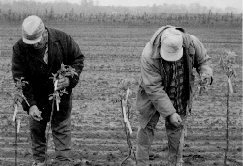 It
often seems difficult to find enough time to instruct new employees.
Yet proper job training is recognized as being fundamental to
reducing potential for accidents and injuries in the workplace.
It
often seems difficult to find enough time to instruct new employees.
Yet proper job training is recognized as being fundamental to
reducing potential for accidents and injuries in the workplace.
Many seasonal workers may be first-time farm employees. Never assume that these people know exactly what is expected of them. Put yourself in their place--it can be frustrating and scary to simply be directed to the workplace, with no instruction on how to complete a particular job properly!
Explain techniques that can make a task easier. The result will be a happier workforce and--most likely--a higher level of productivity.
All farm businesses should have a written safety policy. Such a document provides a set of guidelines that encourage safer work habits. The safety policy should be discussed in detail with all new workers.
Following are a few key points that contribute to safer working conditions:
Never assume that an individual knows what to do--it could prove fatal! Even if a person claims to have experience, go through the training exercise and monitor job performance after the employee has had time to adjust to the task.
Proper job instruction is basic to maintaining a safe operation. When a worker is trained to perform a specific task in the correct manner, benefits include less frustration, improved morale, increased productivity, and a safer workplace.
Farm Safety Association Home Page
Disclaimer and Reproduction Information: Information in NASD does not represent NIOSH policy. Information included in NASD appears by permission of the author and/or copyright holder. More